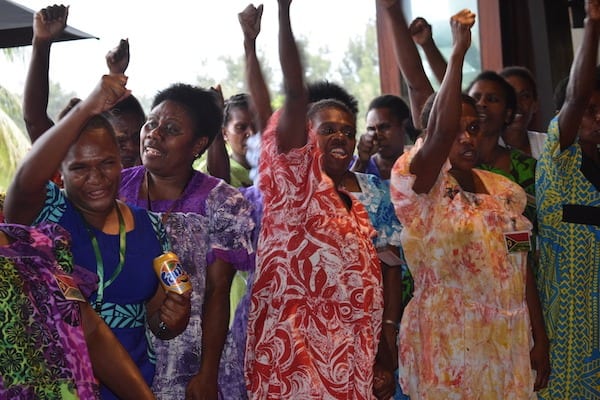Evacuation centres. Banks, or wire services. Lower school fees. These are the kinds of practical community concerns that the rural women of Vanuatu’s islands were raising with government officials.
It was a first: rural women in Vanuatu rarely get a say in local, let alone national government affairs. Yet here they were — about 70 of them, some having travelled by multiple modes of travel over many hours, some leaving their communities for the first time — making their voices heard.
Back in July, I had the privilege to sit with the women as part of Vanuatu’s first ever National Women’s Convening: Women’s Leadership in Humanitarian Action. The women were serious and focused as they split up into small groups to workshop the issues that their communities face in times of crisis, and possible solutions. The second day saw them present these to, and engage with, national government and international humanitarian officials.
I have spent the bulk of my 20 year career in international development, climate change policy, and philanthropy, yet for me the convening was a first as well. I had never come across an initiative that so effectively intersected so many critical issues — human rights, women’s leadership, climate resilience, disaster response.
I first got involved with ActionAid Australia some 18 months ago, when I was invited to join the Leadership Circle for the newly created ARISE Fund. ActionAid has been responding to disasters for over 40 years, with a focus on women for more than a decade. With ARISE, it marks a global first in supporting women-led emergency preparedness and response with a long term focus.
Despite being disproportionately impacted by disasters, women’s voices are often ignored and their agency not recognised. And yet, when disasters strike, women are often the first to take action.
Putting their lives on the line to protect others, women are likely to account for the needs of the whole community and to create lasting, sustainable change.
ARISE is working with eight countries to prepare women for when disaster comes, because disasters – due to climate change – are becoming more frequent and more intense.
When Cyclone Pam roared through Vanuatu in 2015, it damaged 90 percent of the nation’s infrastructure, shut down communications, destroyed homes, schools, clinics. Livelihoods were lost. Violence, especially at home, was a problem.
ActionAid erected basic blue tents around rural communities on a few islands. Here women could congregate and discuss their issues.
As emergency needs were sorted and more long-term issues raised, the project evolved into a network of female leader groups called Women I Tok Tok Tugetha (WITTT), which is partly funded by ARISE. Today, some 4,800 women participate in the weekly meetings.
Esther Kume, a leader from Tanna, told me: “We women have many challenges. Lack of education is a challenge. It’s mostly our fathers and husbands who are educated and they tell us ‘You are not going to school because you are a woman or a girl’, and mostly it’s the boys who go to school. So if you want to be a leader, some people will say to you, ‘You don’t have the education, you can’t be a leader’.”
“Some women want to take leadership, but men overpower them. The men tell you, ‘You can’t do it,’ and sometimes they even stop us from going to the meetings.”
“We can overcome this is if we mobilise women, if we learn, and we can have more trainings. This helps us become confident – the more you talk, the more you become a leader.”
The women at the convening talked about challenges, but they also had successes to build upon.
In Tanna, for instance, after Pam women wrote to the Ministry of Education requesting that school fees be waived, as most families had lost their livelihoods.The request was granted and kids stayed in school. In the subsequent years, the conversation has evolved to a permanent reduction in fees.
The following year, in Erromango, rural women successfully lobbied the government to rebuild a badly storm-damaged school in the same region, rather than further away as had been proposed. This kept more rural children in school.
In 2018, Vanuatu’s first centre for people with disabilities was created in Espiritu Santo, after various communities lobbied for inclusive services.
Anthea Arukole, the First Political Adviser for Vanuatu, Internal Affairs, said to me: “When I started working in the humanitarian sector in 2000, I’d go to communities and meet with women and nobody would talk. They would be shy, stand and laugh and smile and not say anything. Nobody had ever asked them what they thought, or what they wanted in this area, so they didn’t talk about it. They didn’t know how. Now they are able to articulate their needs and they can come and speak about issues that affect them.”
ARISE aims to empower 1 million women in 5 years with the resources and networks they need to lead their communities in times of crisis. We are looking for people to join the movement. People who know a woman’s place is leading the charge. And people who know that investing in women’s leadership will fundamentally transform the world for good.
Sign up here and get involved.



